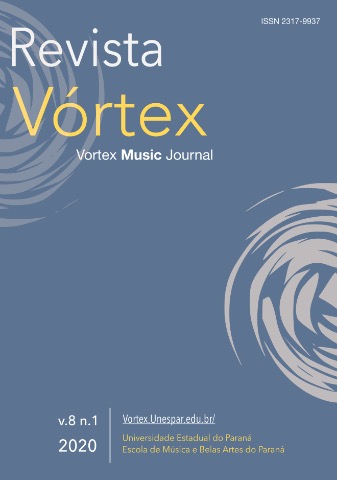In the Era of Computers, Internet and Multimedia, are we still Teaching Composers to become Chapel-Masters?
Visualizações: 83DOI:
https://doi.org/10.33871/23179937.2020.8.1.1-14Resumo
The ongoing paradigm shift from traditional methods of teaching music composition towards new approaches based on computer technology for sound production is the main focus of the article. The paper reviews the evolution of teaching methods throughout the Classical, Romantic and Modern periods, demonstrating how certain standard practices from former ages, based on the professional profile of the Chapel-Master, become theoretical golden principles for subsequent periods. After the French Revolution the traditional method of individual practical exchange between master and disciple was upgraded at the Conservatory. Classes for groups of students required a new approach based on theory abstraction. Although none of these teaching methods have been abandoned up today, a new paradigm appears when the tools of computer technology became widespread. An unpredictable equilibrium between the traditional methods and the new techniques of computer-assisted or computer-generated music composition tends to emerge.
Downloads
Referências
ARNOLD, J. R. Grétry's Operas and the French Public: From the Old regime to the Restoration. Abingdon: Routledge/Ashgate, 2016. DOI: https://doi.org/10.4324/9781315562865
BARAGWANATH, Nicholas. The Italian Traditions & Puccini: Compositional Theory and Practice in Nineteenth Opera. Bloomington: Indiana University Press. 2011.
ROIG-FRANCOLI, Miguel. Harmony in Context. New York: McGraw-Hill. 2013.
SCHUMANN, Robert. A Symphony by Berlioz. Neue Zeitschrift für Musik. Six instalments, between July 3 and August 14, 1835.
SCHUSTER-CRAIG, John. Schumann Encounters Berlioz: The Symphonie fantastique and Schumann's String Quartets, Op. 41. Faculty Scholarly Dissemination Grants, 2010. Retrieved from: <https://scholarworks.gvsu.edu/fsdg/105>. Accessed on: 31 jan. 2020.
Downloads
Publicado
Como Citar
Edição
Seção
Licença
Copyright (c) 2021 Rodolfo Coelho de Souza

Este trabalho está licenciado sob uma licença Creative Commons Attribution 4.0 International License.
Autores mantêm os direitos autorais e concedem à revista o direito de primeira publicação, com o trabalho simultaneamente licenciado sob a Licença Creative Commons Attribution que permite o compartilhamento do trabalho com reconhecimento da autoria e publicação inicial nesta revista.


